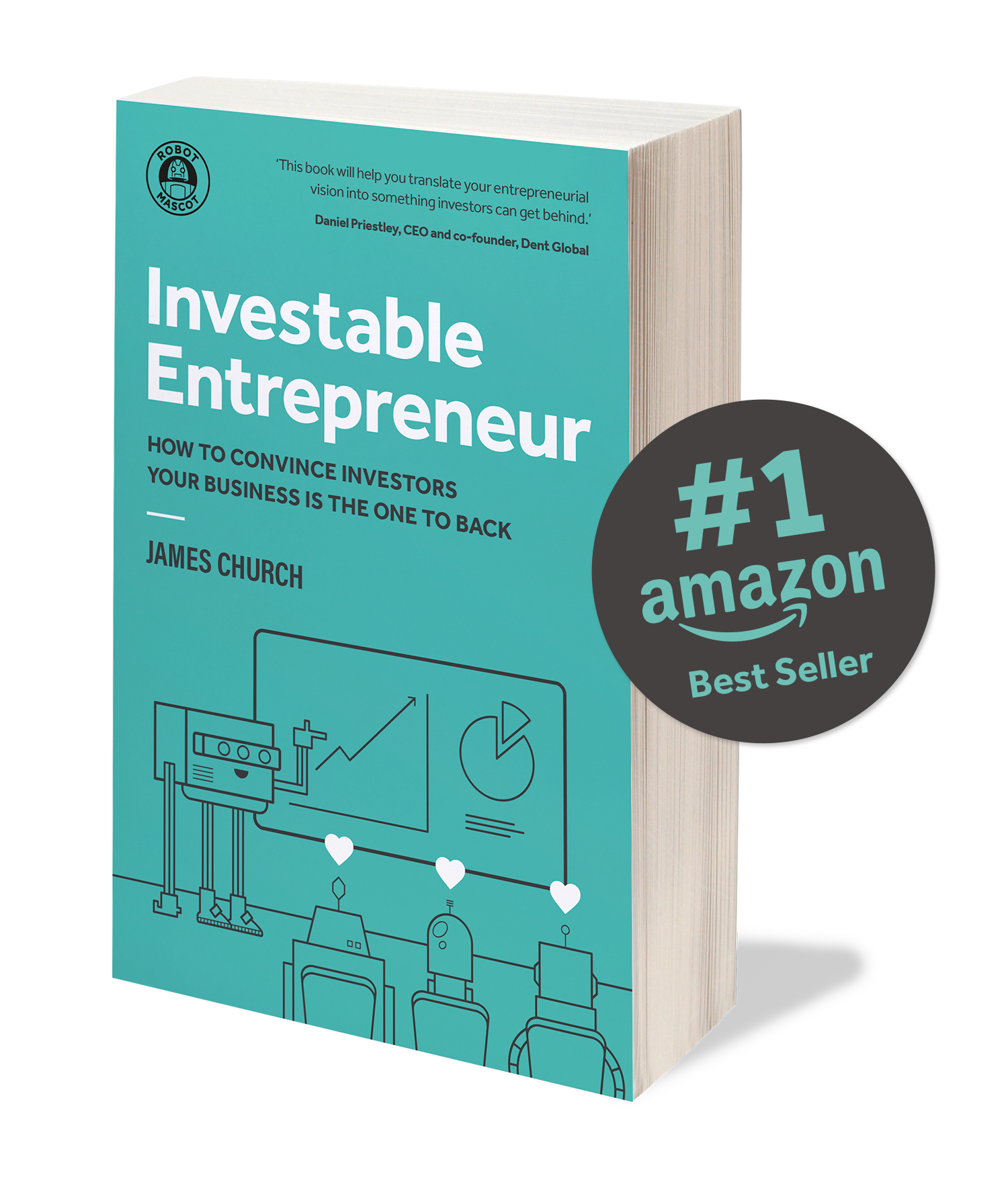

How to Make a Great First Impression With Angel Investors
17th June 2025
For many entrepreneurs, meeting an angel investor is a pivotal moment – a chance to secure funding, mentorship and invaluable connections. But it’s also a high-stakes encounter where first impressions can make or break your opportunity. Angel investors are inundated with pitches, so standing out requires preparation, authenticity and a clear understanding of what they’re looking for.
This article will guide you through the steps to make a lasting first impression with angel investors. From crafting a powerful elevator pitch to engaging in meaningful conversations, every section is designed to give you actionable advice rooted in real-world expertise.
Don’t forget that Robot Mascot can help you prepare a winning investor pitch deck to help you secure funding.
Why first impressions matter

The adage “you never get a second chance to make a first impression” holds especially true in the world of angel investing. Investors often decide whether they’re interested in a startup within the first few minutes of an interaction. These initial moments aren’t just about pitching your idea – they’re about showcasing your competence, passion and professionalism.
Think of the first meeting as an audition, not just for your business but for you as a founder. Angel investors want to back people they believe in. Your ability to communicate clearly, present your vision with confidence and respond to questions thoughtfully can set the tone for a successful partnership.
Research: know your audience
The foundation of a great first impression starts long before the meeting. It begins with research. Understanding who you’re speaking to and tailoring your approach to their interests is non-negotiable.
READ: A Complete Guide to Angel Investors for Small Businesses and Startups
Understand the investor’s background
- Dig into their past investments: What types of businesses have they backed before? Are they industry specialists or generalists?
- Review their professional achievements: Many angels are former entrepreneurs. Knowing their background can help you connect on a personal level.
- Look for public interviews, articles, or social media posts that reveal their priorities or interests.
READ: 11 Essential Things Angel Investors Look For in a Startup
Tailor your approach
Angel investors appreciate when founders show they’ve done their homework. For instance, if an investor has a history of supporting sustainability-focused startups, highlight how your business aligns with that mission. A one-size-fits-all pitch won’t resonate.
Tools to help with research
Platforms like AngelList, Crunchbase and LinkedIn can provide detailed information about potential investors. Additionally, look into industry-specific angel networks, where you might find investors who are particularly relevant to your niche.
READ: Top UK Angel Investment groups: National and Regional
The three critical fundraising assets angel investors want to see

When seeking investment, you’re not just selling your business idea; you’re selling yourself as an entrepreneur capable of delivering returns. Investors expect you to demonstrate resourcefulness, financial acumen and a clear path to commercial success. To do this effectively, you need three key assets:
1. Pitch materials
A suite of tools, including an investor pitch deck, teaser pitch, presentation pitch and a one-pager, that communicate your vision clearly and concisely. Each serves a unique purpose, from intriguing investors to providing detailed insights and supporting your verbal presentations. Together, they help you make a strong, consistent impression throughout your fundraising journey.
2. Financial projections
Investors want realistic, detailed forecasts that include profit and loss, cash flow summaries and key metrics. These show you’ve thoroughly considered the financial realities of your business and provide evidence of its potential for growth and returns.
3. Business plan
This document is the foundation of your fundraising efforts. It must outline your market research, demand calculations, operational structure and long-term growth plans. A strong business plan answers investors’ questions, mitigates risks and demonstrates your capability to build a viable, scalable company.
READ: Critical Fundraising Assets: The three key assets you need to win investor confidence
Perfect your elevator pitch
Your elevator pitch is your first impression distilled into 30 seconds. It’s your opportunity to hook the investor, spark curiosity and lay the foundation for a deeper conversation.
Key elements of a strong pitch
- The problem: Start with a compelling description of the problem you’re solving. This shows you understand your market and its pain points.
- The solution: Explain your unique offering. Avoid jargon – clarity is key.
- Market opportunity: Quantify the potential. Is it a billion-dollar market? Are you addressing an underserved audience?
- Traction: Include proof that your idea works, whether it’s early customer adoption, revenue, or partnerships.
- The ask: Be specific about what you’re looking for, whether it’s a meeting, feedback, or a particular investment amount.
Examples of elevator pitches
Weak example:
“We’re building an app that helps people manage their finances better.”
Strong example
“Millions of people struggle to manage personal finances effectively, costing them thousands each year. Our app, BudgetBuddy, uses AI to create personalised spending plans and has already helped 10,000 users save an average of £500 in six months. We’re raising £250,000 to expand our reach and build additional features like debt management tools.”
Master the art of storytelling
Humans are hardwired to respond to stories. A well-told story can make your pitch unforgettable, creating an emotional connection that data alone cannot.
Why storytelling matters
While numbers and metrics are important, they don’t always resonate on their own. Investors want to understand the “why” behind your business. A compelling story can provide context, inspire confidence and make your vision feel tangible.
How to structure your story
- The founder’s journey: Why did you start this business? Personal anecdotes can humanise your pitch and make it relatable.
- The problem: Paint a vivid picture of the pain points your audience faces.
- The transformation: Show how your solution changes lives, saves time, or improves outcomes.
- The future: End with a vision of what’s possible with the investor’s support.
READ: How To Structure A Pitch Deck
Pro tips
While passion and vision are important, angel investors need hard evidence to back their decision. You should come armed with metrics that prove your business is viable and scalable, so…
- Use analogies or comparisons to simplify complex ideas. For instance, “Our platform is like Airbnb, but for events”
- Practise your story with peers or mentors to refine your delivery and ensure it resonates.
- Be prepared with data and evidence
READ: Becoming Recognised: The Power Of Storytelling
Metrics that matter
Customer acquisition cost (CAC): How much does it cost to acquire a new customer?
Lifetime value (LTV): What is the average revenue a customer generates over their lifetime?
EBITDA Margin: The ratio between revenue and Earnings Before Interest, Tax, Depreciation and Amortization (EBDITA)
Market size: Demonstrate the total addressable market (TAM) to show your growth potential.
Traction: Highlight key milestones, such as revenue growth, user adoption, or partnerships.
READ: How to Set Business Objectives
Be honest about challenges
Investors respect transparency. If your business faces risks or challenges, acknowledge them and explain how you plan to mitigate them. Pretending everything is perfect can come across as naive.
Nail your personal presentation
Your personal presence matters as much as your pitch. Confidence, clarity and professionalism can significantly influence an investor’s perception.
Body language and tone
While a suit isn’t always necessary, your attire should reflect your professionalism and the culture of your industry. Authenticity is key – don’t overdo it, but don’t underdress either.
Maintain steady eye contact to show engagement.
- Use open gestures to appear approachable and honest.
- Vary your tone to keep your delivery dynamic and engaging.
- Dress for the occasion
READ: How to overcome presentation anxiety
Engage in active listening

Great founders aren’t just great talkers – they’re great listeners. Investors want to see that you’re coachable and open to feedback. Active listening not only builds rapport but also helps you refine your pitch and address concerns more effectively.
Tips for active listening
- Take notes during the meeting to show you value the investor’s input.
- Pause before responding to ensure your answers are thoughtful.
- Repeat key points the investor makes to demonstrate understanding.
Ask thoughtful questions
First impressions are a two-way street. Asking insightful questions shows you’re discerning about who you partner with and it can reveal valuable information about the investor’s priorities and working style.
Examples of good questions
- Involvement: “How involved do you like to be with the startups you invest in?”
- Support: “What challenges have you helped past startups overcome?”
- Expectations: “How do you define a successful investment?”
- Connections: “Do you have a network of contacts in [specific industry] that could help us?”
Avoid common mistakes
While making a positive impression is vital, avoiding pitfalls is equally important. Some mistakes can derail your meeting before it even begins.
- Overhyping your startup: Exaggerated claims without evidence can undermine your credibility. Stick to facts and realistic projections.
- Being defensive: If an investor challenges your ideas, respond calmly and thoughtfully. Defensiveness can signal a lack of coachability.
- Ignoring the ask: Always end with a clear and specific request, whether it’s a follow-up meeting, feedback, or a funding amount.
- Follow up the right way: Your first impression doesn’t end with the meeting. A thoughtful follow-up can reinforce your professionalism and keep the conversation moving.
What to include in a follow-up
- Gratitude: Thank the investor for their time and insights.
- Key takeaways: Summarise the discussion and highlight agreed next steps.
- Additional materials: Attach your pitch deck or any documents the investor requested.
READ: How to connect with investors and win their trust?
Making first impressions count
Making a great first impression with angel investors isn’t about theatrics or overselling. It’s about preparation, authenticity and a clear understanding of what both parties bring to the table. By researching your audience, crafting a compelling pitch and engaging meaningfully, you can position yourself as a founder worth backing.
Remember, angel investors aren’t just investing in your business – they’re investing in you. Approach every interaction with confidence, openness and a commitment to creating value and you’ll leave an impression that lasts.
Don’t forget that Robot Mascot can help you prepare a winning investor pitch deck to help you secure funding.
Claim your Free Copy of Investable Entrepreneur
Claim your Free Copy of Investable Entrepreneur
Investable Entrepreneur takes you through our winning methodology – the process we use to increase our client’s chances of raising investment by more than 30x.
“This book will help you translate your entrepreneurial vision into something investors can get behind.”
Daniel Priestley, CEO and founder, Dent Global and four times best-selling business author

Keep up to date with what we’re up to via email






Copyright ©Robot Mascot Ltd. All rights reserved.




